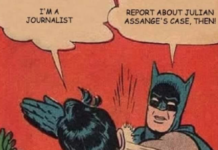Anybody prone to anxiety about state-corporate surveillance should definitely see Cullen Hobach`s documentary `Terms and Conditions May Apply`. You will be wide awake throughout the screening. Afterwards, Google and Facebook`s on-line user contracts will read like a Franz Kafka novel and feel like a Faustian pact.
The joys of the web, it seems, comes at the price of unlimited third party access. It wasn`t always so. Back in 2000 Google promised users individual anonymity; only aggregated search records would be available to others. After the 9-11 terror attacks however, this guarantee disappeared from on-line user contracts, privacy protections were trumped by national security imperatives. The documentary also revealed that the original policy doesn`t even exist on Google`s own on-line archive. `Roll on the deletion of history` I said to myself amidst the spellbound theatre audience.
It is important here to reflect upon the commercial aspects of third party surveillance; state sanctioned spying is only part of the problem. Google analytics registers on –line traffic flows and search patterns for advertisers and market researchers. Facebook`s entire business model requires users to relinquish any attachment to privacy without hesitation. Candid comments and pictures among Facebook friends about social occasions, leisure-entertainment activities, favourite websites, purchasing preferences and social issues are immensely valuable to advertisers and marketers. To get at this material they will pay Facebook for the necessary proprietary software. Our continual desire to create and co-create content constitutes free labour for market research companies, advertisers and their corporate clients. Why pay interviewers to extract personal information? Just sign a contract with Facebook, the personal information is already there.
Similarly, why should the CIA, FBI, Mi6 or the CGSB rely exclusively on professional spies? Our everyday use of IPads, IPhones, Google, Facebook and Youtube delivers exactly what they need. On this matter Holbach`s documentary was especially disturbing. Among the interviewees were surveillance vendors, a new strata of retailers specialising in interception equipment and software. One enthusiastic vendor demonstrated a device that could record and store mobile phone communications in real time. ` Probably not on special at Walmart or Noel Leemings` I thought.
At this stage the theatre was deathly quiet, the crackle of popcorn and icecream cones were nowhere to be heard. On a lighter note the film makers tracked Zuckerberg himself walking along the footpath outside his home. He agreed to talk, reluctantly and sparingly, if the camera was turned off. We chuckled in the knowledge that the right to privacy wasn`t entirely dead . Finally, after the credits rolled, Edward Snowden`s revelations were added to the film. We now know that an operational framework called PRISM allows the United States National Security Agency (NSA) to obtain collected information from the servers of Microsoft, Yahoo, Google, America-On-Line (AOL), Skype, You- Tube, Apple and Pal-talk. Simultaneously, communications from fibre cables and other transmission infrastructures have been collected and stored.
More recently, it has been revealed that an NSA programme called X-Keyscore allows unauthorised analysts to search through vast databases containing emails, on-line chats and browsing histories. Compared to this Orwell`s `1984` looks like a liberal democracy. Ok…..I admit that was an exaggeration. My point though is that we have moved beyond Orwell`s dystopia. `Big Brother` was a state monolith imagined in the shadow of fascist and Stalinist regimes. Today, however, top down surveillance comes from two sources at once; the state and the corporate sector.
Social media corporations and intelligence agencies share a common objective; the destruction of individual privacy. Furthermore, as Edward Snowden reveals, data mining and intelligence gathering is subcontracted to private companies.
In contrast to `1984` the individual citizen cannot easily trace a clear line of culpability back to an identifiable `big brother` entity. Contemporary power structures are more complex and harder to pin down. Surveillance systems cannot operate without some degree of individual and social compliance but todays popular complicity is something else. Our enthusiasm for divulging private information on-line would have mortified Orwell. `Why are you building a web of surveillance for your rulers` I can almost hear him say.
Back in the 1940s Orwell could not have envisaged todays massive capacity for automated, 24/7 real time surveillance worldwide. We are beyond `1984` now but the spirit of Orwell himself persists in the likes of Julian Assange, Bradley Manning, Edward Snowden and documentary makers such as Cullen Hobach. The audience filed out of the theatre quietly, reflecting perhaps, on the underlying menace of that anodyne phrase `terms and conditions may apply`.





